Mobile app development is a lengthy process that requires a thorough approach, but low-code mobile app builders can help make startup app development ten times faster. Low-code mobile app development platforms allow you to run business applications while maximizing the saving of time and other resources. In this brief review, let’s highlight the 7 best solutions and consider them in more detail. Moreover, exploring white-label app options could provide startups with customizable and cost-effective solutions to expedite their app development journey and meet market demands swiftly.
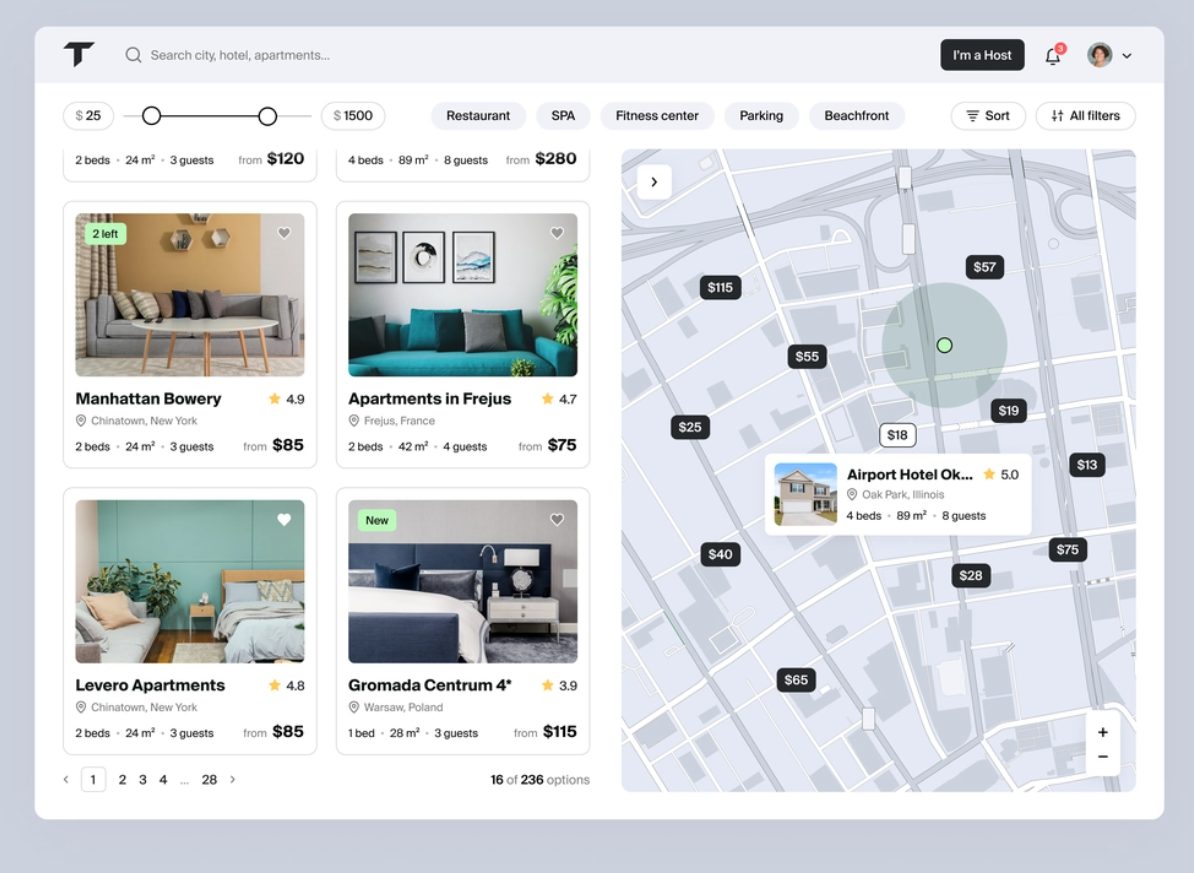
What is low-code?
Low code is an approach to software development that uses a graphical user interface with simple drag-and-drop functionality and logic instead of relying on traditional, hand-written codes, to create application software. As such, little to no coding is required to develop low-code apps.
The low-code mobile development enables the development of applications ranging from simple to complex, meeting intricate business development needs. It accelerates business digitalization and shortens the time to market with offshore Android developers.
Do you really need a mobile app for your business? Explore our article to learn the main pros of the mobile app for startups and make an informed decision.
What are the benefits of low-code mobile app builders?
Here are several significant advantages of mobile app development low-code that may greatly influence your final decision.
Speed
The speed of development affects a variety of business processes, including:
- corporate sales management
- loyalty program management
- customer service management
- marketing management
- HR management.
The apps you produce with low code will make a difference.
High productivity
Low-code development removes the barrier between time and real innovation. You can create more applications in less time because there’s no need to write lengthy, complex code constructs. So, you can churn out applications faster, which improves productivity.
Flexibility
The low-code approach helps to create applications that operate at digital speed. This creates app experiences that allow users to interact seamlessly with apps on various devices. For example, collaboration apps and tools are just as effective on a desktop PC as they are on a smartphone, etc.
Cost efficiency
App development costs are reduced due to the absence of the need for the services of development teams and the use of expensive tools, etc.
Business flexibility
A key advantage of the low code approach is its ability to create cross-platform apps that may work on different devices, enhancing business flexibility.
Risk management
The rules and conditions for business in the market often change; low-code development enables more efficient risk management, as simple automation makes fixing mistakes a breeze and helps minimize risks.
What are the downsides of low-code?
Here are the major cons you may come across with low-code or no-code mobile app development:
Limited opportunities
Low-code offers limited features. System developers have access only to predefined blocks on a specific platform. This limitation makes it difficult to customize the apps, especially if the existing blocks do not offer the required functionality.
Performance issues
While low-code application platforms are known for their versatility, no tool can excel at everything. As a result, low-code platforms may struggle with heavy loads, resulting in performance issues. When such problems arise, the only way out is to rewrite the application using traditional coding.
If you’d still prefer to try traditional coding, start by exploring mobile app development languages in our dedicated article.
Integrations
Integrating applications with external systems using a low-code platform is not possible. This is especially true when cross-functional teams need to integrate with legacy systems and the APIs are not structured according to the standards.
Top low-code development platforms in 2024
Now let’s explore some of the best low-code mobile app builders that developers from various companies use in multiple projects.
1. Airtable

Airtable is a powerful, large database platform trusted by over 200,000 organizations worldwide. It modernizes your business processes by creating powerful applications for a wide range of tasks. You can streamline your workflow by integrating services like Slack, Gmail, Facebook, Twitter, Teams, Google Sheets, and more into your apps. Airtable allows you to work from anywhere, anytime. You can edit, annotate, and sync changes across all devices using the desktop and mobile apps.
Pros
- Visualize information in an orderly and appealing manner
- For easier use of information, you can hide it instead of removing or archiving it
- Use the same data source to build various views that cater to various purposes, instead of updating multiple locations
Cons
- The interface functionality of Airtable could use some improvement
- Although the graph/chart apps are excellent, they lack customization options
2. Back4App
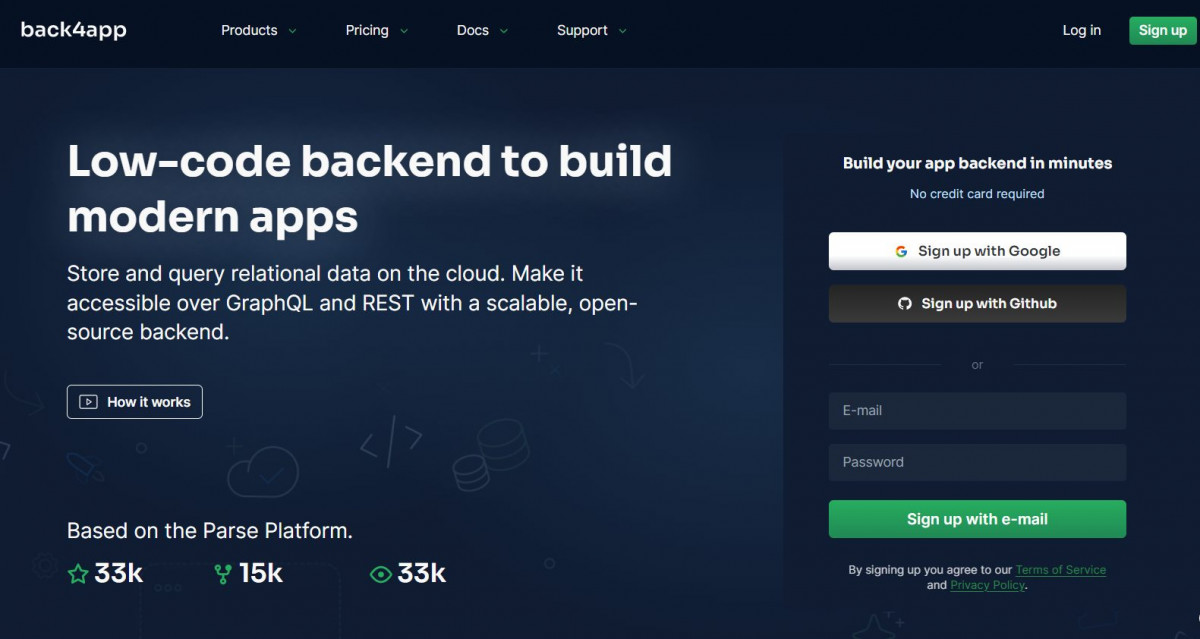
A low code mobile app builder that strives for maximum simplicity and flexibility in the world of app development, Back4App has already been featured in many industry publications.
Back4App is a modern solution for modern developers. It provides an easy way to create, host, and deploy applications on a single platform, serving as a centralized API and backend platform.
Back4App allows developers and designers to create and deploy applications that enhance the user experience without requiring them to dive into complex infrastructure.
Pros
- Back4App is recognized as a tool in the Realtime Backend/API category tech stack
- It is an open-source tool
- Offers spreadsheets-like ease for databases
- Integrates caching services
- Provides 24/7 support
Cons
- Requires the use of a self-hosted database
- Building the backend can require a significant amount of effort
3. Zoho Creator
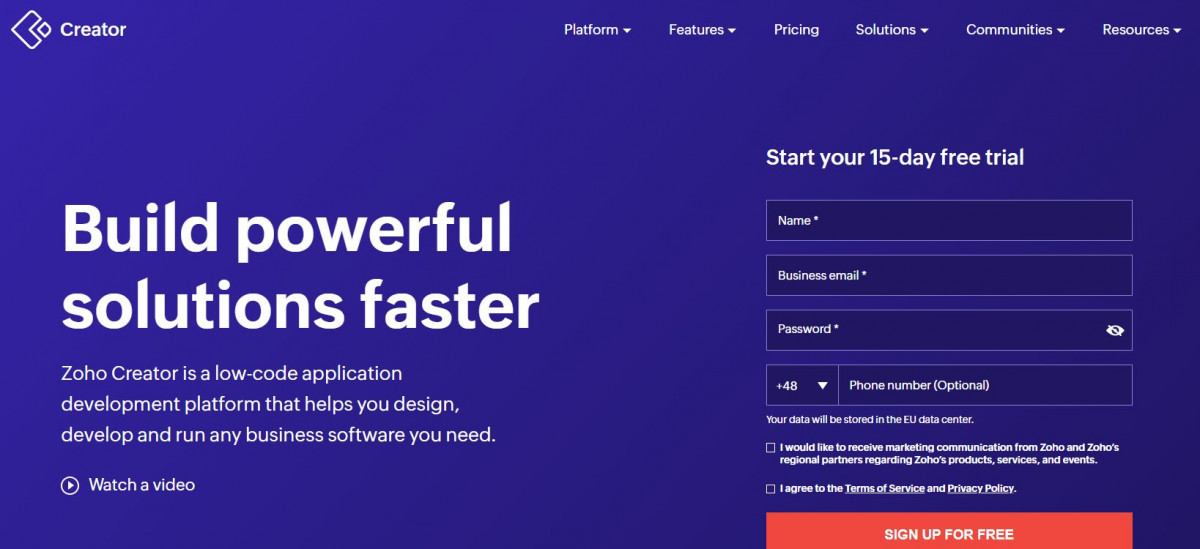
This platform stands out as one of the most competent in the realm of low-code solutions and robust functionality. It allows users to perform tasks quickly, easily, and safely, regardless of their level of technical knowledge in programming.
It is a set of tools that can transform your business by creating conceptual multi-platform applications, from minimalist call logs to complex ERPs.
Pros
- Drag-and-drop builder for easy use
- Ability to integrate your existing data
- Option to publish databases online
Cons
- You can’t edit rich text fields
- You can’t print or duplicate records
- The conditional formatting does not apply to the dropdown, radio, multi-select, checkbox, lookup, users, integration, and Zoho CRM fields
4. OutSystems
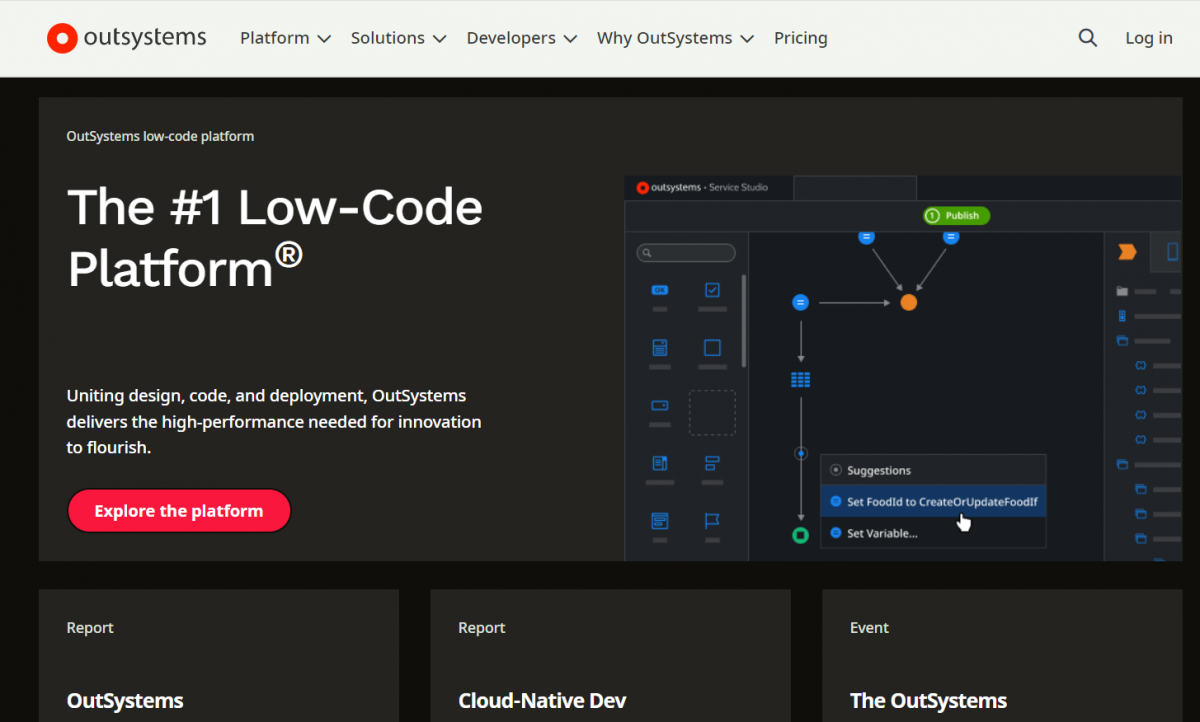
OutSystems is designed to transform software development and help you quickly build and deploy complex applications leveraging the cloud, DevOps, and AI. With this low-code mobile app builder, managing routine business processes becomes straightforward, even as market needs evolve.
The platform offers various automation services and integrated tools for building secure, scalable, easy-to-manage, and fault-tolerant applications.
Pros
- Facilitates low-code application development by integrating design, coding, and deployment to simplify development
- Adapts to a set of requirements that may change due to business needs, innovation processes, regulatory regulations, and new technologies with OutSystems.
Cons
- You cannot play with systems entities or core platform components
- Sometimes, it becomes challenging to migrate data or applications from other platforms to Outsystems.
5. Backendless
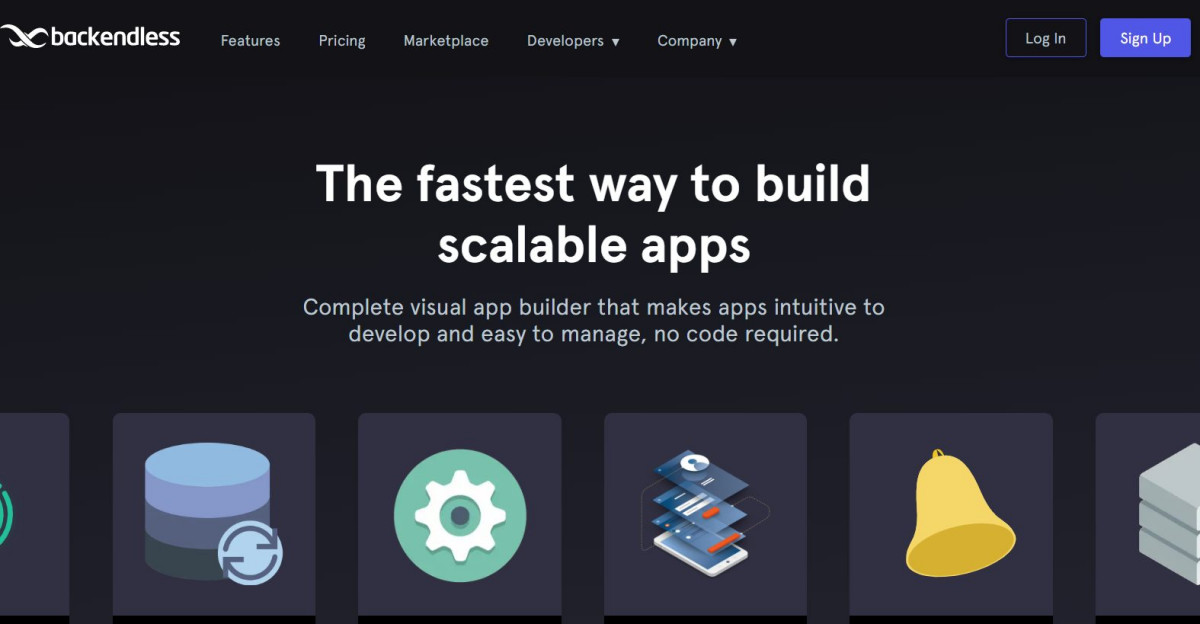
Backendless is an advanced application development platform that believes modern organizations should be able to quickly build and update their software solutions.
It offers a dynamic, secure, and scalable technology solution for persistent data storage. It is a low-code VADP that combines a user interface builder with a user-friendly database and API management functionalities.
Pros
- Backendless provides serverless capabilities, a real-time database, user authentication and authorization, file storage, API management, push notifications, geolocation services, and more.
- To guarantee the security of your data and apps, Backendless offers robust security features, including SSL encryption, OAuth 2.0 authentication, and role-based access management.
Cons
- It does not offer Premium Consulting/Integration Services.
6. BuildFire
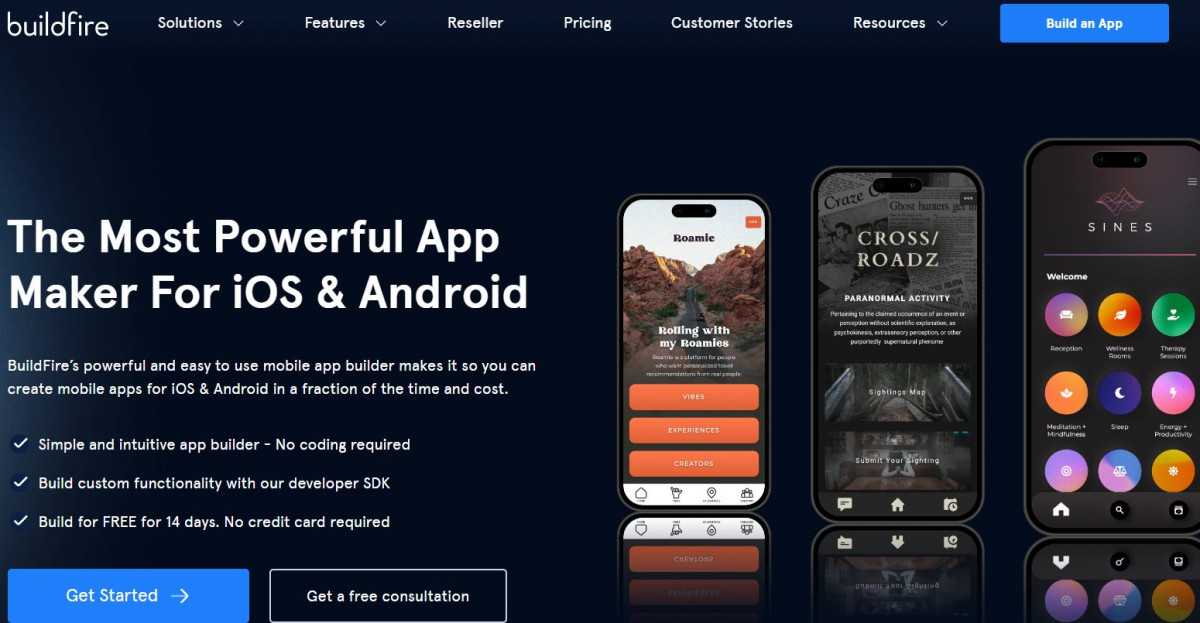
BuildFire is an all-in-one platform known for its low-code approach and ease of use. It aims to bridge the gap between business and IT teams, allowing people without developer knowledge to consistently build apps.
BuildFire’s powerful application builder makes it easy for application developers to build custom applications in the fastest and most cost-effective way. This enables organizations to accelerate and scale innovation.
Pros
- BuildFire low-code platform is user-friendly
- Suitable for small companies and individual websites
- Ease of customization
Cons
- As the amount of data or pages increases, the app can become slow or may crash
- Some of the basic features fail to meet app requirement guidelines
7. Appy Pie
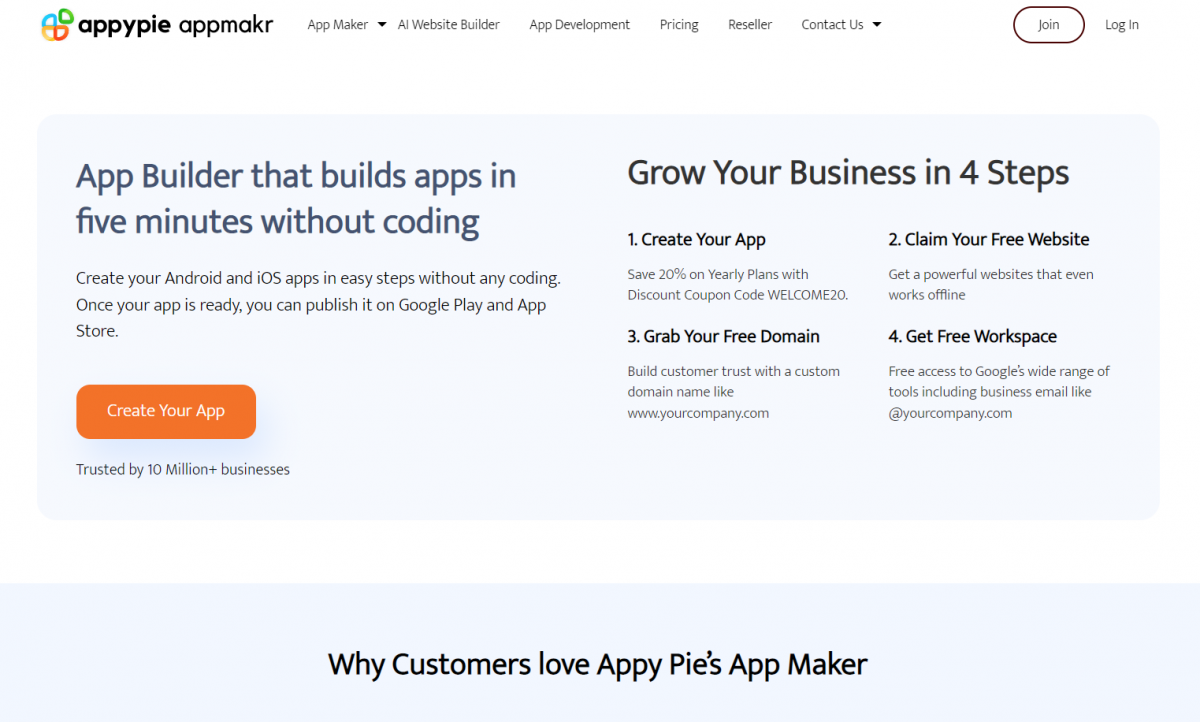
Appy Pie is one of the most well-known low-code software development solutions, offering organizations today an easy environment to build applications quickly.
Appy Pie democratizes app development and design, allowing developers to build apps regardless of their coding knowledge, budget constraints, and technical skills.
This web-based mobile app builder allows you to drag and drop various features to create apps, meaning your app will be ready in minutes.
Pros
- An excellent tool for creating applications instantly without the need for coding or prior experience
- Cost-effective, since it uses cloud storage and requires no server purchases or maintenance costs
Cons
- While setting up an app, there are occasional issues with uploading videos or photographs, which may require restarting the process
- The application requires a fast-processing computers/laptops to run effectively. Read Also: Kotlin vs Flutter
Conclusion
The low-code approach to app development with bespoke software development services certainly helps to speed up the software development process. Thus, an ideal low-code mobile app development platform from the list of platforms presented in the review will be able to cope with the primary concerns of users in no time.
With these intuitive, low-code platforms, developers from cross-platform app development companies can build applications with minimal coding. This results in less workload for the IT team and greater agility within the organizational landscape.
Another way to lessen the workload for your IT team? You can hire developers or outsource your project to Fireart Studio. Don’t be shy and contact us today with your project — we’ll be happy to help!
FAQ
What is the best low-code mobile app builder?
The best low-code application platform often varies based on specific business needs, but Airtable, OutSystems, and Back4App are some of the most popular now.
Can I use low-code for mobile app development?
Absolutely, the realm of low code is your gem for mobile app development, making the journey from concept to launch smoother and faster than traditional coding routes.
What is the best platform for low-code IOS app development?
For those aiming to sculpt the next groundbreaking iOS app without diving deep into traditional coding, Appy Pie and OutSystems emerge as the go-to canvases, blending simplicity with sophistication.
Is low-code the future?
With its promise of democratizing development and slashing deployment times, low code is not just a passing trend but a significant part of the future of how we create, iterate, and deploy software solutions.
What is the best platform for low-code Android app development?
For low-code Android app development, Zoho Creator and OutSystems are among the top choices.




















